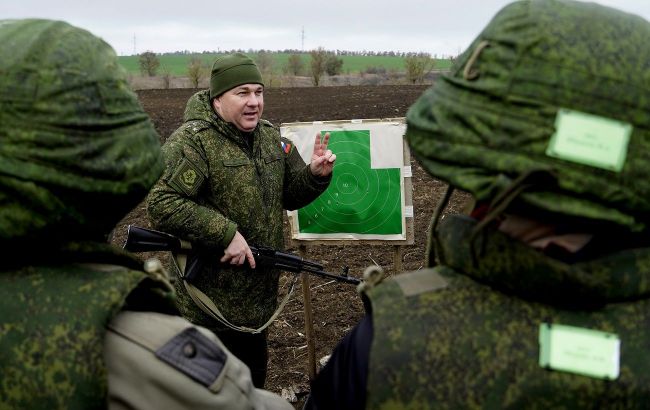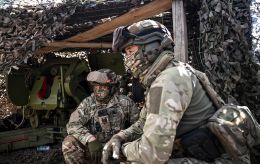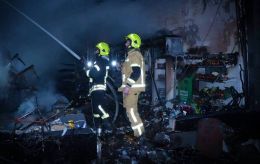Raids, drone attacks in Russia - Border guards complain about lack of fight means
 Russian military (photo: Getty Images)
Russian military (photo: Getty Images)
Russian border guards are reportedly facing a lack of capabilities and equipment to counter potential cross-border raids into Russian territory and combat so-called "drone attacks," report analysts from the Institute for the Study of War (ISW).
In the report, it is noted that employees of the Russian Border Service have expressed dissatisfaction with their limited capabilities, similar to complaints from Russian military personnel in the occupied territories of Ukraine.
Border guards have voiced concerns about potential "Ukrainian raids" into Russia.
A Russian "war correspondent" who works with the Kremlin's human rights council amplified their complaints, stating that the Russian government poorly equipped the border guards and failed to provide them with an adequate number of digital communication systems, reconnaissance and strike drones, mobile transport, and medicines.
According to the blogger, similar complaints are coming from almost all border units of the Russian FSB. He noted that modern border units of the FSB require capabilities similar to those of operational groups that participated in the Soviet-Afghan War, equipped with artillery, aviation, and armored vehicles.
The "war correspondent" also claimed that border units only receive anti-tank missiles and mortars through personal connections with Russian military units and called on the authorities to provide them to current border guards, especially in the Bryansk, Kursk, and Belgorod regions bordering Ukraine.
The mention of the "war correspondent's" reference to the participation of Soviet border guards in the Afghan War and the call for more advanced systems suggest that Russian border guards, like in the past, are concerned about the threat of potential "Ukrainian cross-border raids" into Russia and "attacks by Ukrainian drones" on Russian territory, according to the report.
Key findings:
-
On September 11, the Armed Forces of Ukraine (AFU) continued their counteroffensive operations in Donetsk and Zaporizhzhia regions and reportedly advanced in the vicinity of Bakhmut and in the western part of Zaporizhzhia region.
-
The Russian National Guard (Rosgvardia) may be recruiting former mercenaries from the Wagner Private Military Company (PMC) who were previously incarcerated, possibly for the purpose of further subordination of remaining elements of the group while strengthening Russia's domestic security apparatus.
-
The ruling party in the Kremlin, "Yedyna Rosiia," achieved the majority of desired "results" in highly falsified local pseudo-elections in Russia and the occupied part of Ukraine.
-
North Korean leader Kim Jong Un and Russian dictator Vladimir Putin will meet in Vladivostok in the coming days, likely to discuss bilateral relations and the supply of artillery ammunition from North Korea to Russia.
-
On September 11, American and Armenian forces began joint military exercises in Armenia.
-
Russian forces conducted offensive operations on September 11 along the Kupiansk-Svatove-Kreminna line, in the vicinity of Bakhmut, along the Avdiivka-Donetsk line, on the eastern border of Donetsk region, on the western border of Zaporizhzhia region, and advanced in certain areas.
-
On September 11, Ukrainian Armed Forces conducted offensive operations at least on one front and made advances in the vicinity of Bakhmut, along the Avdiivka-Donetsk line, along the western border of Donetsk region, along the eastern border of Zaporizhzhia region, and in the western part of Zaporizhzhia region.
-
The head of the Central Election Commission of Russia, Alexander Sidiakin, claimed that "Yedyna Rosiia" allegedly received the majority of "votes" in the fake "elections" in the occupied parts of Luhansk, Donetsk, Zaporizhzhia, and Kherson regions of Ukraine.
-
Military officials from Ukraine and the United Kingdom reported on September 11 that Russian military intends to mobilize over 400,000 servicemen by the end of 2023.
Transborder raids by Russian volunteers
In early June, fighters from the "Russian Volunteer Corps" (RVC) and the "Legion of Freedom of Russia" (LFR) announced the conduct of an operation in the Belgorod region. Volunteers claimed that they were trying to help Ukraine fight against the occupiers.
During the operations, the volunteers reported successes, including taking several occupiers captive and destroying several enemy vehicles.
RVC fighters also conducted raids in the Bryansk region. During one of these operations in September, two employees of the Russian Border Guard Service were eliminated. Additionally, within a few days, RVC representatives claimed to have conducted a fire raid in the border area of Russia.

